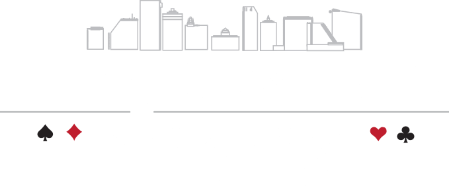Every city casino turned an operating profit in 2015, according to figures released Thursday by state regulators.
And collectively, the eight casinos saw operating profit increase 40 percent last year, the state Division of Gaming Enforcement said. The eight gambling halls reported $547 million in gross operating profit in 2015, up from $390 million in 2014.
“To me, that’s an indication that the market is stabilizing after several years of turmoil,” said Casino Control Commission Chairman Matthew Levinson.
Gross operating profit is a key measure of casino performance that takes into account many of the short-term costs of casino operation — paying for supplies and employees, for example — but excludes some larger expenses, such as taxes.
The city’s heavyweights posted impressive 2015 profits, including Borgata Casino Hotel & Spa, which reported $216 million in gross operating profit — up 36 percent and within striking distance of a quarter-billion-dollar year.
Four Atlantic City casinos closed in 2014. Revenue from orphaned gamblers was absorbed by the remaining eight operators.
Joe Lupo, Borgata’s senior vice president of operations, succinctly described Thursday what was arguably the central narrative of the industry here last year: “Less supply in the market meant more demand for each property.”
In 2014 Resorts Casino Hotel, managed by minority owner Mohegan Sun, posted $2.5 million in gross operating profit — its first annual profit since 2008. Last year, the figure was up more than fivefold, to $15.6 million, at the city’s smallest casino.
“Mohegan’s doing a very good job of managing that property,” said Colin Mansfield, a casino analyst at Fitch Ratings.
Gambling revenue increased 3.1 percent, to $2.5 billion, in 2015 among the city’s eight extant operators. And a larger chunk of revenue is dropping down to the bottom line, Mansfield said.
“More broadly speaking, this has sort of been a trend over the last couple years,” he said. “A lot of operators are going back and looking at their business and looking at where they can create some efficiencies and where they can take some cost out of a business.”
Speaking from the casino floor Thursday, Resorts CEO Mark Giannantonio, insisted, as he often does, on giving a shout out to the property’s workers for the strong numbers.
“It starts and ends with the service of our employees, and I just couldn’t be prouder,” he said.
“We may not be the biggest, but we are certainly a force to be reckoned with here in Atlantic City. We have the product, we have the service.”
In addition to the gain in gambling revenue among extant operators, room revenue was up 0.8 percent. So were food and beverage sales.
But entertainment and miscellaneous revenue, which includes revenue from shows and spas, was down 1.2 percent. And revenue generated from third-party companies that lease space within the casino hotels for operations of all sorts — nightclubs, restaurants, retail outfits — fell 2.7 percent at current operators.
The market snapshot released Thursday was tempered further by what state regulators have termed “industry total” numbers.
In contrast with the “current operators” figures, the “industry total” breakdown compares the eight-casino 2015 Atlantic City market with the actual 2014 market numbers, which include revenue from the four casinos that closed that year.
Casino revenue, on an “industry total” basis, declined 6.5 percent in 2015, room revenue was down 14.1 percent, food and beverage sales dropped 9.1 percent, and entertainment and miscellaneous revenue slid 15.9 percent.
Third-party sales were down 23.8 percent — a symptom, perhaps more than anything else, of the September 2014 closing of Revel Casino Hotel, which took a raft of well-regarded third-party restaurants with it.
